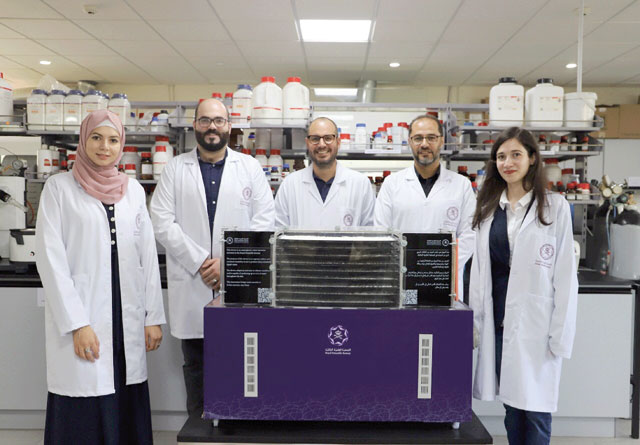AMMAN — A team of researchers at the Royal Scientific Society (RSS), Jordan’s largest research institution, has developed a machine that can use even the most arid air as a reservoir for drinking water.
Harnessing water vapour in the form of humidity, the patented device can produce up to 35 litres of water per day, even under the dry, desert conditions of Jordan, according to a statement from the RSS.
The process can be carried out multiple times a day to deliver a continuous supply of clean drinking water.
Jordan is one of the world’s poorest countries in terms of water resources, and these are being depleted faster than they can be replenished.
Climate change is exacerbating the problem. Responding to this challenge, a team at the RSS’ Advanced Research Centre set out over three years ago to develop a solution that addresses this problem by treating the atmosphere as an untapped reservoir, said the statement.
Led by Kyle E. Cordova, executive director of scientific research, and Husam Al Massad, staff scientist, the research team designed the novel atmospheric water harvesting machine to selectively capture and collect humidity from the surrounding air and condense it into liquid water.
The machine has been vetted, validated, and approved under a “rigorous peer-review process” with the results being published in one of the world’s most prestigious scientific journals, Nature Communications.
Harnessing cutting-edge technology, the machine uses porous, molecular sponges that are designed to efficiently and selectively capture, concentrate, and condense water vapour from dry, desert air. Once the molecular sponge is full, water is released by increasing the air’s temperature.
The released water vapour is then condensed to yield liquid water that is filtered and mineralised for human consumption. This process can be driven by an external, solar-powered energy source.
The research team’s scientific report details how the machine operates using a proprietary algorithm that monitors climate fluctuations in real time to continuously optimise water production and power consumption, said the statement.
This resulted in a three-fold increase in daily water production, even in the arid desert. Crucially, the cost per litre is as low as 6.5 US cents and the water produced meets the national drinking standards of Jordan.
The RSS has registered a worldwide patent to commercialise the device through a spin-off company called AquaPoro Ventures Ltd., which aims to manufacture the machine in Jordan to bring water independence and security to families and communities by mid-2023. The RSS, in the statement, said that it sees this new technology as an important addition to an urgently needed armoury of tools to provide long-lasting global water solutions.
